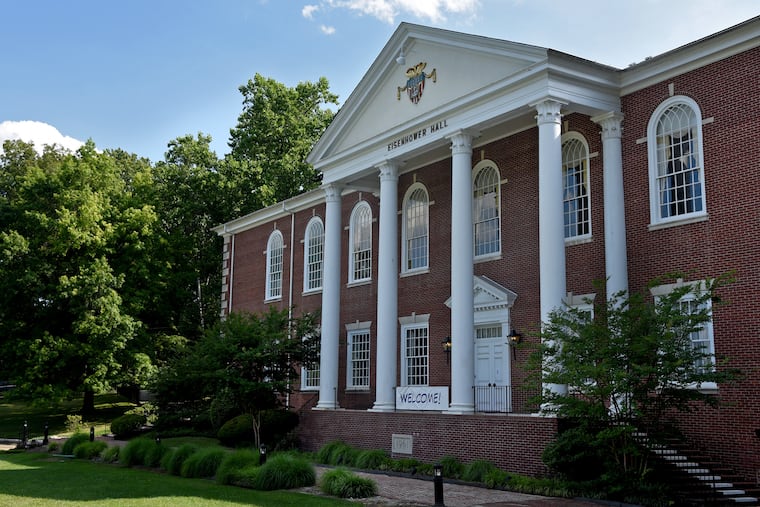For a second time, a charter school is being proposed at Valley Forge Military Academy
Unlike the last proposal, which was put forward by the military academy, the latest application is being advanced by backers with no formal ties to the Main Line private school.

Supporters are trying again to open a military-themed charter school on the grounds of Valley Forge Military Academy and College, despite a denial from the Radnor school board last year.
Unlike the previous proposal — which was put forward by the military academy and which Radnor rejected as an apparent effort “to subsidize VFMA and make VFMA available to students through the use of public funds” — the latest application is being advanced by backers with no formal ties to the Main Line private school, including a recently retired Republican state senator and a former head of a charter school advocacy group. The chairman of the proposed charter’s board said it would be a “marriage made in heaven.”
In the latest proposal, Pennsylvania Military Charter School would still rent facilities from VFMA — paying $3 million a year, according to its application to Radnor, compared with $500,000 in the proposal rejected in May 2021.
VFMA, which has faced declining enrollment and financial losses, has balanced its budget in recent years and doesn’t need the rent to operate, according to its president.
The new charter application is supported by a charter school management company that started in Arizona and now runs schools in states including Florida, Nevada, and North Carolina.
The company, Charter One, initiated the latest application, said Joshua Johnson, the chair of the board for the proposed charter, which is now pending before the Radnor and Tredyffrin/Easttown school boards.
A retired U.S. Army Green Beret who now works for a leadership development firm, Johnson, who lives in Carlisle, said he was contacted by Charter One to serve on the board.
“We think there’s still a need ... to have an alternative to a traditional school that’s based on military school principles, but doesn’t fall into that boarding school category,” Johnson said in an interview, adding that some parents “can’t necessarily afford the tuition Valley Forge charges.”
Unlike VFMA — which costs $39,000 for boarding students, and $24,000 for day students — the charter would be free to attend. Charter schools are publicly funded; in Pennsylvania, school districts pay charters based on the number of enrolled students and what the district spends per child.
Pennsylvania Military Charter says it would enroll 975 students from kindergarten through 12th grade — about four times as many students as are currently on the campus. The boys-only academy enrolls about 140 students in grades 7 through 12, while 80 more are enrolled at the military college, according to school officials.
“As their population has decreased, it’s left an opening” for a charter, Johnson said of VFMA.
In a presentation to the Radnor school board Dec. 13, Johnson said that the nearest public schools with JROTC units were 30 minutes away, and limited to high school. The charter, however, would start “cadet leadership training” in grade 6. Johnson said the charter would prepare students not just for careers in the military, but also for college and leadership roles in any organization.
As for the connection with the military academy, “think of it as two completely separate entities occupying the same ground,” Johnson said. He said the charter and academy would be “working hand in hand, but they don’t have a say in our curriculum. They don’t have a say in our staff. They don’t have a say in the activities we conduct.
“It just so happens that several of theirs and several of ours will be very similar,” he said.
Col. Stuart Helgeson, president of Valley Forge Military Academy and College, said in an interview that the proposed charter “aligns perfectly with what we do here at Valley Forge.” Most of the academy’s students are part of the boarding program, with fewer than 10 day students, Helgeson said.
Helgeson said the rent money would be paid to the foundation supporting the academy.
The charter’s $17 million budget includes $1 million for an educational service provider fee; that money would go to Charter One for professional services and operational supports, Johnson said.
According to the charter’s application, the fee would also cover an “aggressive” marketing plan to potential students, including paid social media advertisements and direct mail.
Among those who have also agreed to serve on the charter’s board are recently retired State Sen. Bob Mensch, a Republican who didn’t seek reelection, and Lenny McAllister, a senior fellow with the conservative Commonwealth Foundation who previously was CEO of the Pennsylvania Coalition of Public Charter Schools.
Following Johnson’s presentation to the Radnor board, the lone public comment came from a woman who questioned why the charter hadn’t included gender identity or sexual orientation in its nondiscrimination policy; whether gay or lesbian students would be welcome; and what plans the school had to avoid hazing and abuse. (In rejecting the previous charter proposal, the Radnor board had said VFMA failed to adequately address community concerns about abuse allegations at its school.)
“Respect for persons is absolutely one of the things we’re going to drive,” Johnson said. “But when it comes to gender identification, it will be our policy that the gender and name on the birth certificate is how they’re going to be addressed at our school.”
The Radnor school board will hold another hearing Jan. 17 for board members and administrators to ask questions about the application.
The charter has also applied to the Tredyffrin/Easttown School District, where some of its athletic facilities would be located, Johnson said. A district spokesperson said the school board would schedule a hearing in January.
In order for the charter to win approval, both districts would need to grant its application, a spokesperson for the Pennsylvania Department of Education said.